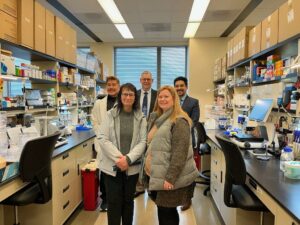LBCA Patient Advocate Cindy Hays has been busy reaching out to scientists who are implementing promising breast cancer research to encourage them to focus additionally and specifically on lobular breast cancer. Last November Cindy made LBCA staff aware of a new and promising technique targeting the dynein proteins that could halt breast cancer cell motility (i.e., ability to move) that two scientists at Penn State were publicizing. As a recently diagnosed lobular breast cancer patient who lives in Pennsylvania, Cindy had become aware of LBCA and through her own breast cancer journey and acquainting herself with LBCA she knew of the great need for more lobular specific research.
As one already prone to taking initiative when she sees a need, Cindy reached out to LBCA and to the researchers to broker a call about whether lobular breast cancer cells were and/or could be a part of their research. Executive Director Hutcheson met with the researchers via zoom. As Laurie shared more about the issues with and need for more ILC study they became increasingly interested in and vocal about finding a way to add invasive lobular carcinoma to their study because while it was not initially included, they believe that lobular tumors have the characteristics that make it likely that the procedure would also result in stopping lobular cancer cell motility – putting an end to growth and progression.
Fast forward to last month and Cindy’s in person meeting and lab tour at Penn State with researchers Amir Sheikhi, Erdem Tabdanov, and her brother State Senator Cris Dush. On arrival they were met by Dean of Penn State School of Medicine Dr. Karen Kim. Cindy shared that the Penn State researchers have made some strides in determining that ILC can be a part of their study and that they all shared the opinion that lobular breast cancer must be more central in the conversations of all breast cancer research including that being done by the Big 10 Cancer Consortium of which Penn State is a part. Cindy was sure to support these statements and remind all of the need to educate medical students on the differences between lobular and ductal carcinomas reiterating how hard it is for patients when their treatment team seems uniformed about lobular breast cancer. Cindy was happy to share that the Penn State team is very interested in ensuring that patients newly diagnosed with lobular breast cancer across the state are made aware of information about ILC.
Cindy explained that the lab tour and the updates on the research into dynein and its interaction with a protein complex: dynactin and how this can contribute to cell death is fascinating. She noted that the scientists are still interested in adding a lobular cell line to their research and will continue to determine when and how they will do this. We know Cindy will follow-up with them on this. She described the lab tour as “really cool” and she perceived that it opened doors to others at Penn State and at ways to get ILC information to more patients in the state.
Kudos to Cindy for this patient advocacy!


